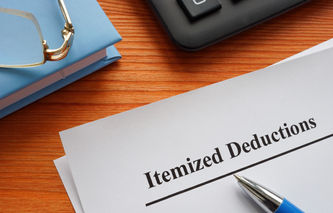The best approach to tax planning is starting early in the year. But it's never too late, even as the April tax filing deadline approaches, for some last minute tax savings tips. After all, a taxpayer's obligation is to pay their fair share of income taxes, and not a dollar more.
Retirement Savings Tax Breaks
It's possible to contribute to an individual retirement account any time prior to the April filing deadline. In fact, this is perhaps the only account an individual can open after the New Year and still claim on the prior year's federal income tax form.
For example, if Lindsey decided she wanted to fund an IRA in 2020, she still has until the April 2021 filing deadline to open that account and claim this on her 2020 tax return.
Keep in mind that Roth IRA contributions are not tax deductible; however, Traditional IRA contributions may be deductible depending on the filer's modified adjusted gross income, and whether or not they're already covered by an employer's pension plan.
Child and Education Tax Credits
In recent years, the child and education tax credits have been more generous. That means additional tax-savings opportunities for parents of children; especially those with dependents attending a college or university.
Child Tax Credit (CTC)
The American Taxpayer Relief Act of 2012, or ATRA, makes permanent the $1,000 CTC (this was scheduled to revert to $500). The Child Tax Credit allows parents to reduce their federal income taxes owed by up to $1,000 for each qualifying child under age 17. To qualify for this tax credit the child must be:
Claimed as a dependent
Under age 17 at the end of the year
A son, daughter, adopted child, grandchild, stepchild or eligible foster child, a sibling, stepsibling, or their descendant
A U.S. citizen or resident alien
Tuition Deductions
In the 2020 and 2021 tax years, it's possible to deduct up to $4,000 for higher education tuition and qualifying fees. This deduction is phased out starting at $83,200 for single filers and $124,800 for joint returns.
Student Loan Interest
In 2020 and 2021, taxpayers that qualify can deduct up to $2,500 in student loan interest, regardless of whether they itemize their taxes. This deduction is phased-out starting at $70,000 for single filers and $140,000 for joint filers.
Education Tax Credits
The Lifetime Learning Credit can be claimed if not seeking, or eligible for, the Hope Credit. It's possible to claim a Lifetime Learning Credit of up to $2,000 for qualified education expenses paid for all students enrolled in eligible educational institutions. There is no limit to the number of years the Lifetime Learning Credit can be claimed for each student.
Business-Related Tax Savings
Even if a taxpayer doesn't own a business, they may still be able to deduct certain business-related expenses if they purchased something for their job and were not reimbursed by an employer. For example, job related travel is deductible on an income tax return. Receipts will be needed as proof of these expenses.
Individuals that work for more than one employer in any tax year, and have earnings in excess of $137,700 in 2020 and $142,800 in 2021, may have paid too much Social Security tax. Individuals can claim a refund on Form 1040 when they file their personal income tax return with the Internal Revenue Service.
Charitable Donations
Tax deductible charitable donations can be in other forms besides check or cash. When donating a car, clothing, shoes, furniture, or other items of value to a recognized charity, detailed records and receipts will be needed as proof for a deduction. The mileage driven for charity is also tax deductible. Back in 2007, the recordkeeping rules for gifts to charity were made more stringent; it's important to know all of the applicable requirements before taking a deduction.
Last Minute Tax Deduction Check List
Finally, here is a tax deduction checklist, which summarizes the types of savings a filer should be looking for when preparing their return:
Penalties for early withdrawal of savings
Alimony paid
Student loan interest
Prescription eyeglasses, contacts, and hearing aids
Crutches, canes, and orthopedic shoes
Medical transportation costs
Cost of alcohol or drug abuse treatments
Charitable contributions
Local and state income taxes
Personal property taxes or real estate taxes
Unreimbursed employee business expenses
Mileage and other expenses associated with volunteer work
Casualty and theft losses
Tax preparation software and fees
Note: Some of the above items can be taken as miscellaneous itemized deductions and as such are deductible to the extent they exceed 2% of the filer's AGI. In the case of medical and dental expenses, they are deductible to the extent they exceed 7.5% of the filer's AGI.



